Tesco's Organisational Behaviour and Cultural Effectiveness Report
VerifiedAdded on 2023/01/03
|10
|2995
|100
Report
AI Summary
This report provides a detailed analysis of Tesco's organisational behaviour and culture. It begins with an executive summary, followed by an introduction that outlines the scope of the study. The main body of the report identifies Tesco's culture using Charles Handy's model, specifically focusing on the role culture plays in employee motivation, communication, and overall organisational effectiveness. The report evaluates how Tesco can leverage its culture to further enhance its success, considering factors such as employee satisfaction, communication strategies, and the impact of its culture on branding and competitive advantage. The analysis draws on secondary research, including relevant theories and models like Maslow's hierarchy of needs, to support its arguments. The report concludes with a summary of key findings and recommendations for Tesco, highlighting the importance of fostering a positive work environment and aligning its culture with its strategic goals. The report emphasizes the importance of communication and motivation in improving organisational effectiveness. The report concludes by evaluating how Tesco can use its organisational culture to further enhance its success. The report provides a comprehensive overview of the subject matter.
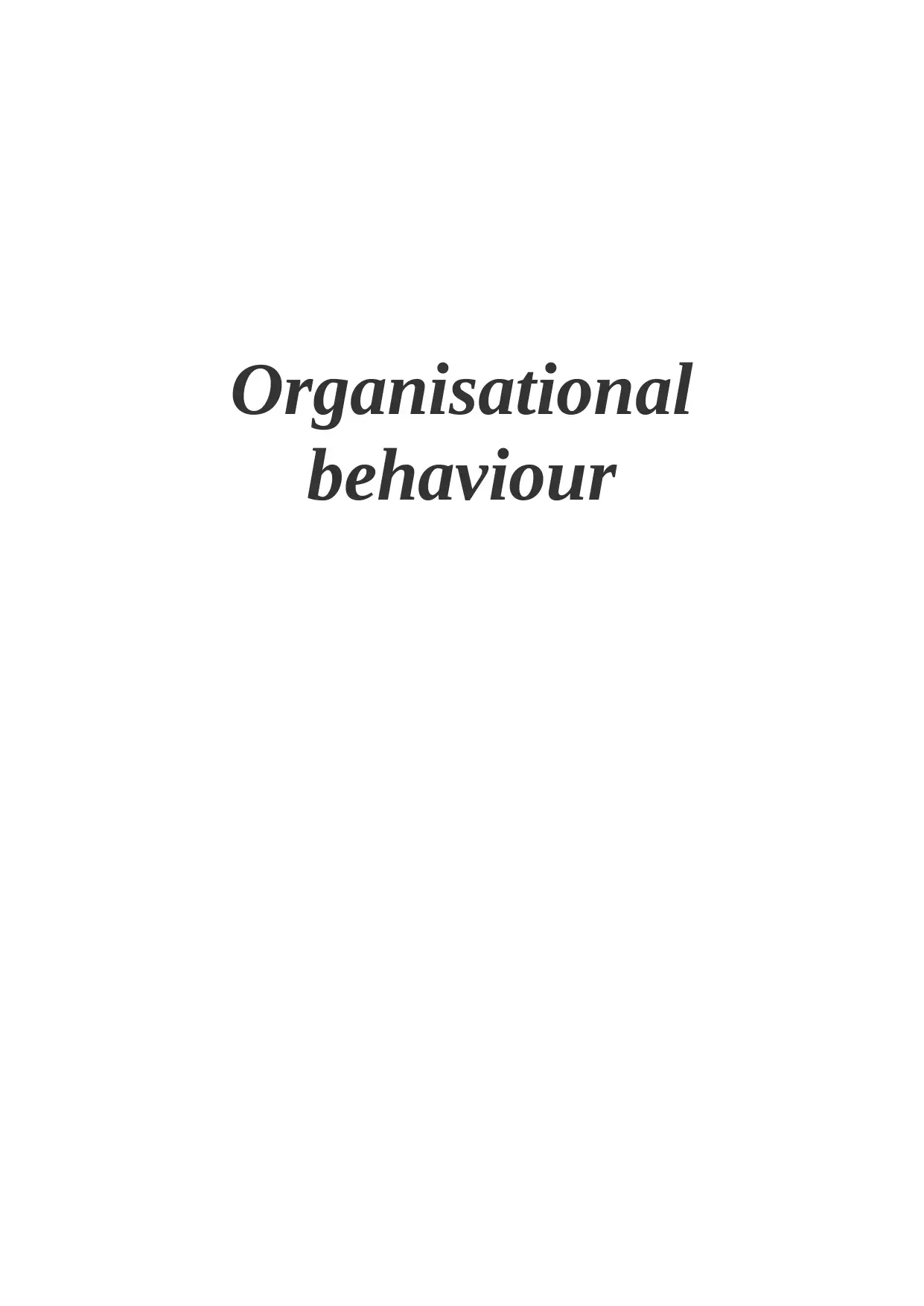
Organisational
behaviour
behaviour
Paraphrase This Document
Need a fresh take? Get an instant paraphrase of this document with our AI Paraphraser
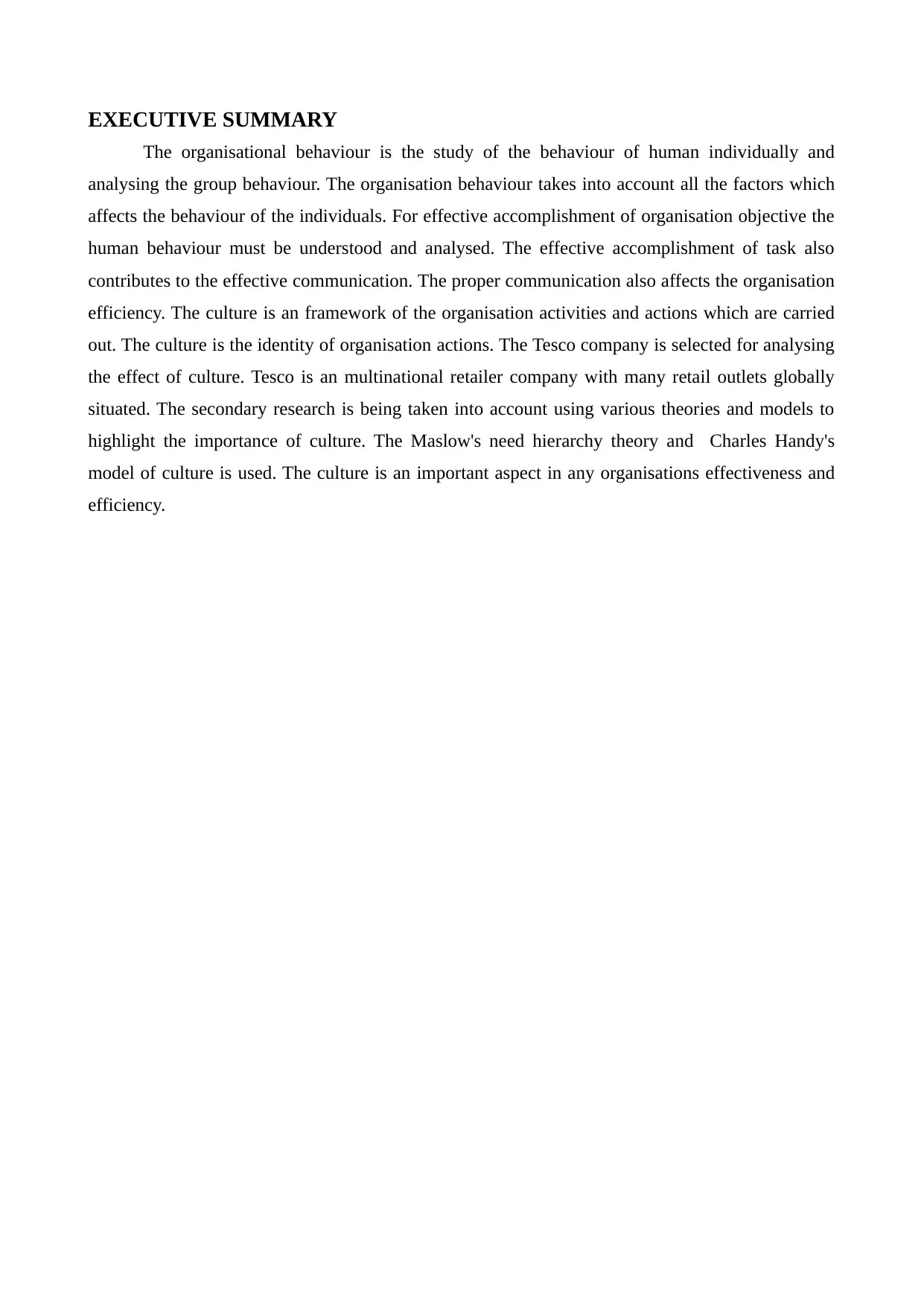
EXECUTIVE SUMMARY
The organisational behaviour is the study of the behaviour of human individually and
analysing the group behaviour. The organisation behaviour takes into account all the factors which
affects the behaviour of the individuals. For effective accomplishment of organisation objective the
human behaviour must be understood and analysed. The effective accomplishment of task also
contributes to the effective communication. The proper communication also affects the organisation
efficiency. The culture is an framework of the organisation activities and actions which are carried
out. The culture is the identity of organisation actions. The Tesco company is selected for analysing
the effect of culture. Tesco is an multinational retailer company with many retail outlets globally
situated. The secondary research is being taken into account using various theories and models to
highlight the importance of culture. The Maslow's need hierarchy theory and Charles Handy's
model of culture is used. The culture is an important aspect in any organisations effectiveness and
efficiency.
The organisational behaviour is the study of the behaviour of human individually and
analysing the group behaviour. The organisation behaviour takes into account all the factors which
affects the behaviour of the individuals. For effective accomplishment of organisation objective the
human behaviour must be understood and analysed. The effective accomplishment of task also
contributes to the effective communication. The proper communication also affects the organisation
efficiency. The culture is an framework of the organisation activities and actions which are carried
out. The culture is the identity of organisation actions. The Tesco company is selected for analysing
the effect of culture. Tesco is an multinational retailer company with many retail outlets globally
situated. The secondary research is being taken into account using various theories and models to
highlight the importance of culture. The Maslow's need hierarchy theory and Charles Handy's
model of culture is used. The culture is an important aspect in any organisations effectiveness and
efficiency.
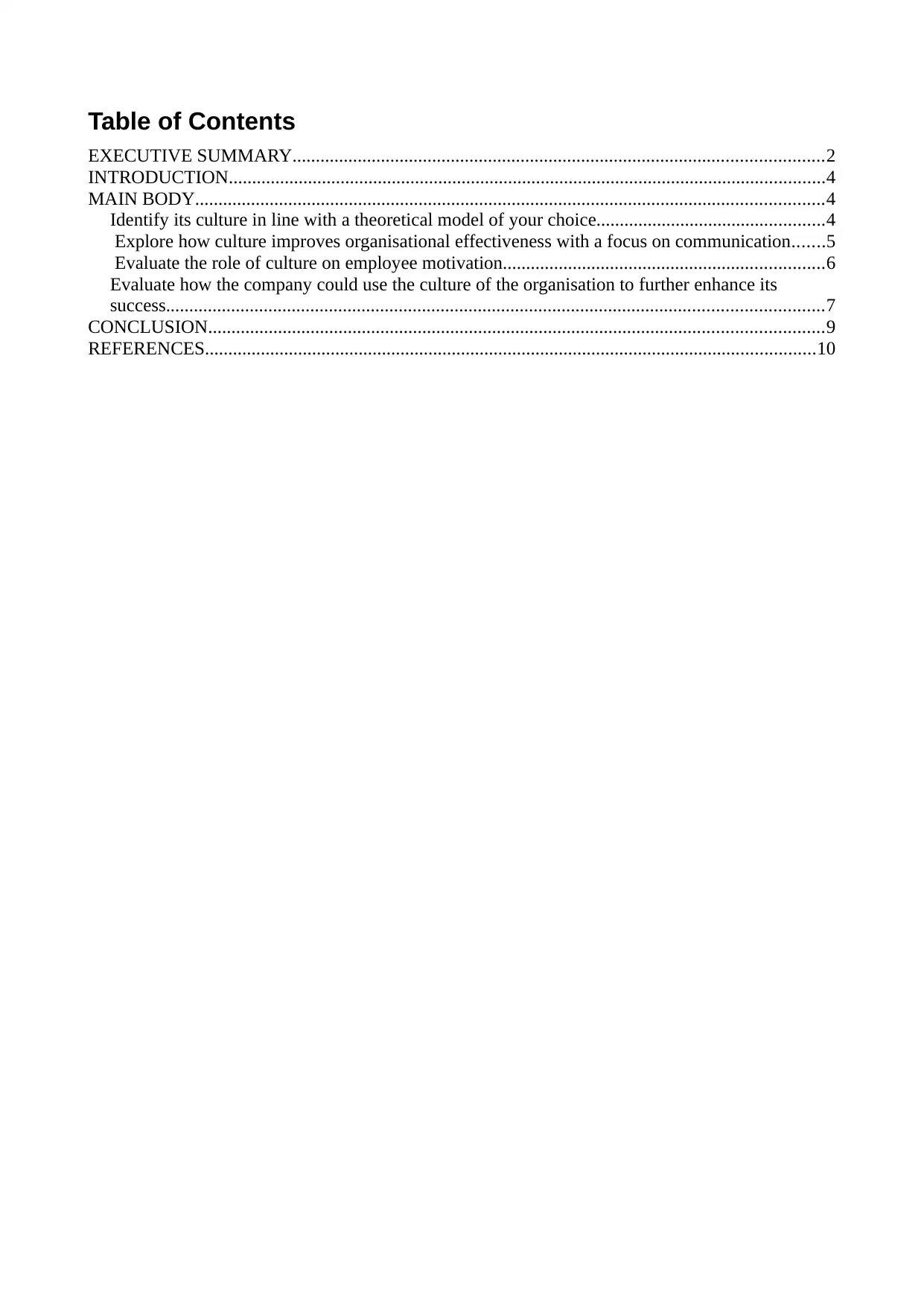
Table of Contents
EXECUTIVE SUMMARY..................................................................................................................2
INTRODUCTION................................................................................................................................4
MAIN BODY.......................................................................................................................................4
Identify its culture in line with a theoretical model of your choice.................................................4
Explore how culture improves organisational effectiveness with a focus on communication.......5
Evaluate the role of culture on employee motivation.....................................................................6
Evaluate how the company could use the culture of the organisation to further enhance its
success.............................................................................................................................................7
CONCLUSION....................................................................................................................................9
REFERENCES...................................................................................................................................10
EXECUTIVE SUMMARY..................................................................................................................2
INTRODUCTION................................................................................................................................4
MAIN BODY.......................................................................................................................................4
Identify its culture in line with a theoretical model of your choice.................................................4
Explore how culture improves organisational effectiveness with a focus on communication.......5
Evaluate the role of culture on employee motivation.....................................................................6
Evaluate how the company could use the culture of the organisation to further enhance its
success.............................................................................................................................................7
CONCLUSION....................................................................................................................................9
REFERENCES...................................................................................................................................10
⊘ This is a preview!⊘
Do you want full access?
Subscribe today to unlock all pages.

Trusted by 1+ million students worldwide
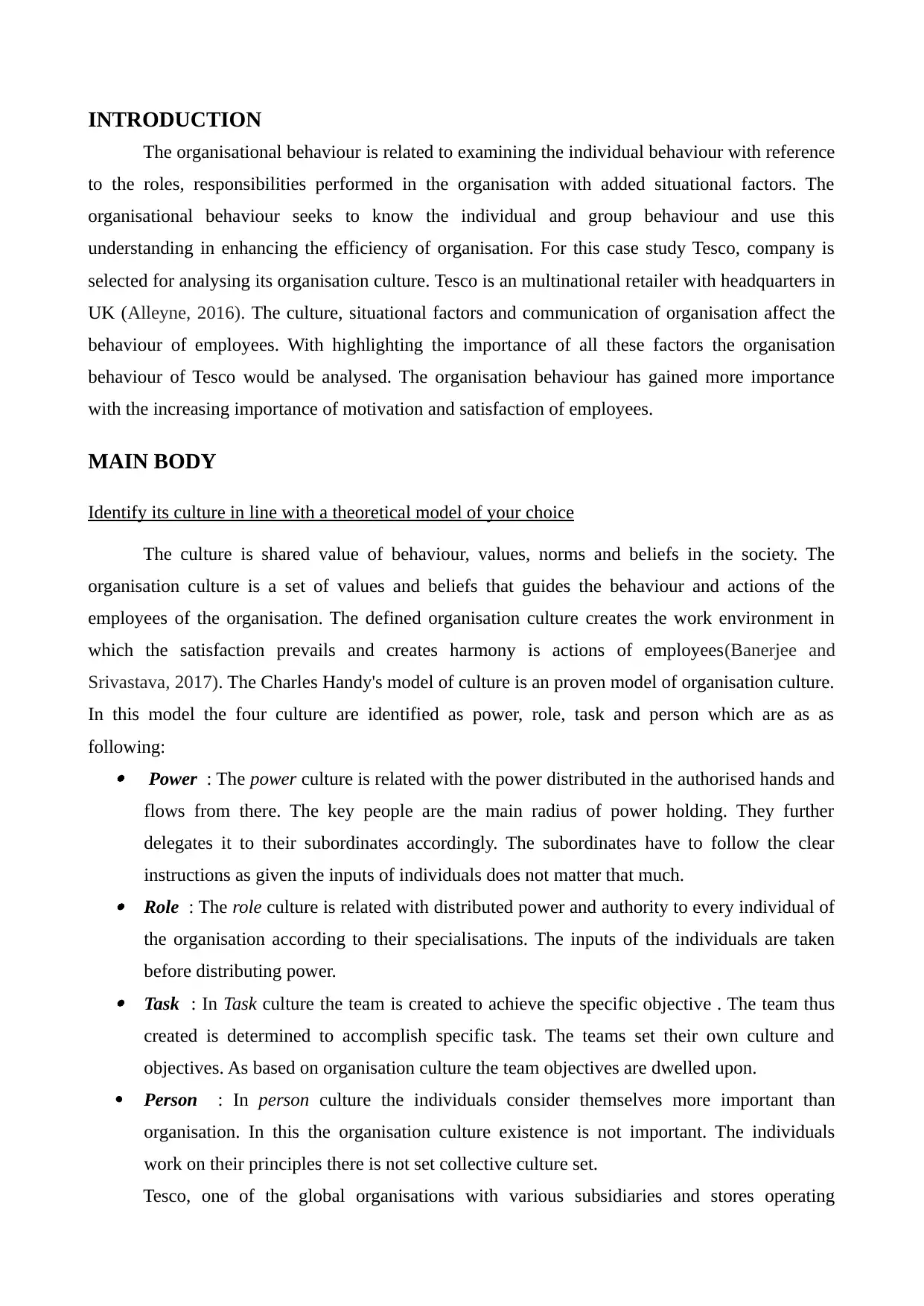
INTRODUCTION
The organisational behaviour is related to examining the individual behaviour with reference
to the roles, responsibilities performed in the organisation with added situational factors. The
organisational behaviour seeks to know the individual and group behaviour and use this
understanding in enhancing the efficiency of organisation. For this case study Tesco, company is
selected for analysing its organisation culture. Tesco is an multinational retailer with headquarters in
UK (Alleyne, 2016). The culture, situational factors and communication of organisation affect the
behaviour of employees. With highlighting the importance of all these factors the organisation
behaviour of Tesco would be analysed. The organisation behaviour has gained more importance
with the increasing importance of motivation and satisfaction of employees.
MAIN BODY
Identify its culture in line with a theoretical model of your choice
The culture is shared value of behaviour, values, norms and beliefs in the society. The
organisation culture is a set of values and beliefs that guides the behaviour and actions of the
employees of the organisation. The defined organisation culture creates the work environment in
which the satisfaction prevails and creates harmony is actions of employees(Banerjee and
Srivastava, 2017). The Charles Handy's model of culture is an proven model of organisation culture.
In this model the four culture are identified as power, role, task and person which are as as
following: Power : The power culture is related with the power distributed in the authorised hands and
flows from there. The key people are the main radius of power holding. They further
delegates it to their subordinates accordingly. The subordinates have to follow the clear
instructions as given the inputs of individuals does not matter that much. Role : The role culture is related with distributed power and authority to every individual of
the organisation according to their specialisations. The inputs of the individuals are taken
before distributing power. Task : In Task culture the team is created to achieve the specific objective . The team thus
created is determined to accomplish specific task. The teams set their own culture and
objectives. As based on organisation culture the team objectives are dwelled upon.
Person : In person culture the individuals consider themselves more important than
organisation. In this the organisation culture existence is not important. The individuals
work on their principles there is not set collective culture set.
Tesco, one of the global organisations with various subsidiaries and stores operating
The organisational behaviour is related to examining the individual behaviour with reference
to the roles, responsibilities performed in the organisation with added situational factors. The
organisational behaviour seeks to know the individual and group behaviour and use this
understanding in enhancing the efficiency of organisation. For this case study Tesco, company is
selected for analysing its organisation culture. Tesco is an multinational retailer with headquarters in
UK (Alleyne, 2016). The culture, situational factors and communication of organisation affect the
behaviour of employees. With highlighting the importance of all these factors the organisation
behaviour of Tesco would be analysed. The organisation behaviour has gained more importance
with the increasing importance of motivation and satisfaction of employees.
MAIN BODY
Identify its culture in line with a theoretical model of your choice
The culture is shared value of behaviour, values, norms and beliefs in the society. The
organisation culture is a set of values and beliefs that guides the behaviour and actions of the
employees of the organisation. The defined organisation culture creates the work environment in
which the satisfaction prevails and creates harmony is actions of employees(Banerjee and
Srivastava, 2017). The Charles Handy's model of culture is an proven model of organisation culture.
In this model the four culture are identified as power, role, task and person which are as as
following: Power : The power culture is related with the power distributed in the authorised hands and
flows from there. The key people are the main radius of power holding. They further
delegates it to their subordinates accordingly. The subordinates have to follow the clear
instructions as given the inputs of individuals does not matter that much. Role : The role culture is related with distributed power and authority to every individual of
the organisation according to their specialisations. The inputs of the individuals are taken
before distributing power. Task : In Task culture the team is created to achieve the specific objective . The team thus
created is determined to accomplish specific task. The teams set their own culture and
objectives. As based on organisation culture the team objectives are dwelled upon.
Person : In person culture the individuals consider themselves more important than
organisation. In this the organisation culture existence is not important. The individuals
work on their principles there is not set collective culture set.
Tesco, one of the global organisations with various subsidiaries and stores operating
Paraphrase This Document
Need a fresh take? Get an instant paraphrase of this document with our AI Paraphraser
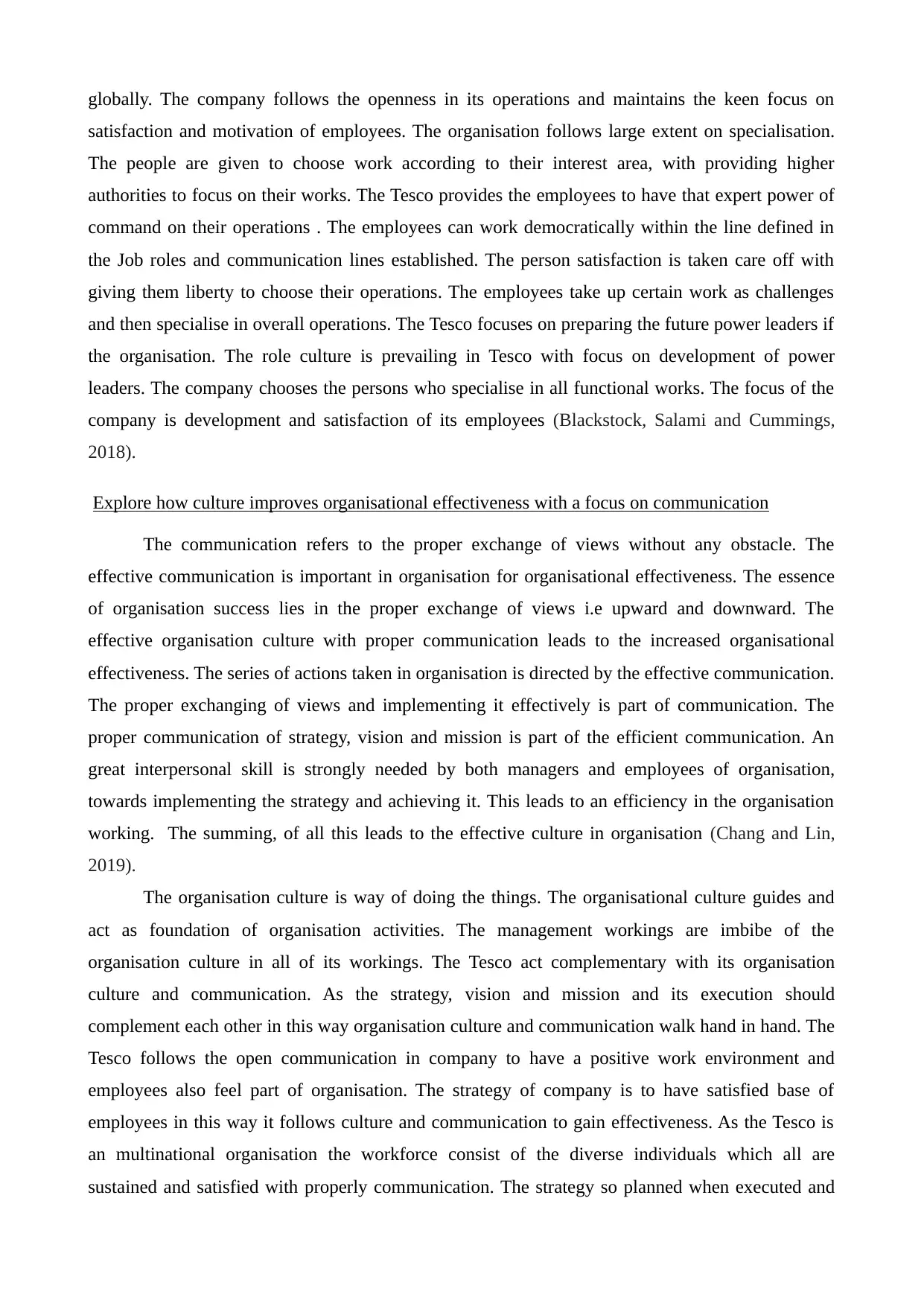
globally. The company follows the openness in its operations and maintains the keen focus on
satisfaction and motivation of employees. The organisation follows large extent on specialisation.
The people are given to choose work according to their interest area, with providing higher
authorities to focus on their works. The Tesco provides the employees to have that expert power of
command on their operations . The employees can work democratically within the line defined in
the Job roles and communication lines established. The person satisfaction is taken care off with
giving them liberty to choose their operations. The employees take up certain work as challenges
and then specialise in overall operations. The Tesco focuses on preparing the future power leaders if
the organisation. The role culture is prevailing in Tesco with focus on development of power
leaders. The company chooses the persons who specialise in all functional works. The focus of the
company is development and satisfaction of its employees (Blackstock, Salami and Cummings,
2018).
Explore how culture improves organisational effectiveness with a focus on communication
The communication refers to the proper exchange of views without any obstacle. The
effective communication is important in organisation for organisational effectiveness. The essence
of organisation success lies in the proper exchange of views i.e upward and downward. The
effective organisation culture with proper communication leads to the increased organisational
effectiveness. The series of actions taken in organisation is directed by the effective communication.
The proper exchanging of views and implementing it effectively is part of communication. The
proper communication of strategy, vision and mission is part of the efficient communication. An
great interpersonal skill is strongly needed by both managers and employees of organisation,
towards implementing the strategy and achieving it. This leads to an efficiency in the organisation
working. The summing, of all this leads to the effective culture in organisation (Chang and Lin,
2019).
The organisation culture is way of doing the things. The organisational culture guides and
act as foundation of organisation activities. The management workings are imbibe of the
organisation culture in all of its workings. The Tesco act complementary with its organisation
culture and communication. As the strategy, vision and mission and its execution should
complement each other in this way organisation culture and communication walk hand in hand. The
Tesco follows the open communication in company to have a positive work environment and
employees also feel part of organisation. The strategy of company is to have satisfied base of
employees in this way it follows culture and communication to gain effectiveness. As the Tesco is
an multinational organisation the workforce consist of the diverse individuals which all are
sustained and satisfied with properly communication. The strategy so planned when executed and
satisfaction and motivation of employees. The organisation follows large extent on specialisation.
The people are given to choose work according to their interest area, with providing higher
authorities to focus on their works. The Tesco provides the employees to have that expert power of
command on their operations . The employees can work democratically within the line defined in
the Job roles and communication lines established. The person satisfaction is taken care off with
giving them liberty to choose their operations. The employees take up certain work as challenges
and then specialise in overall operations. The Tesco focuses on preparing the future power leaders if
the organisation. The role culture is prevailing in Tesco with focus on development of power
leaders. The company chooses the persons who specialise in all functional works. The focus of the
company is development and satisfaction of its employees (Blackstock, Salami and Cummings,
2018).
Explore how culture improves organisational effectiveness with a focus on communication
The communication refers to the proper exchange of views without any obstacle. The
effective communication is important in organisation for organisational effectiveness. The essence
of organisation success lies in the proper exchange of views i.e upward and downward. The
effective organisation culture with proper communication leads to the increased organisational
effectiveness. The series of actions taken in organisation is directed by the effective communication.
The proper exchanging of views and implementing it effectively is part of communication. The
proper communication of strategy, vision and mission is part of the efficient communication. An
great interpersonal skill is strongly needed by both managers and employees of organisation,
towards implementing the strategy and achieving it. This leads to an efficiency in the organisation
working. The summing, of all this leads to the effective culture in organisation (Chang and Lin,
2019).
The organisation culture is way of doing the things. The organisational culture guides and
act as foundation of organisation activities. The management workings are imbibe of the
organisation culture in all of its workings. The Tesco act complementary with its organisation
culture and communication. As the strategy, vision and mission and its execution should
complement each other in this way organisation culture and communication walk hand in hand. The
Tesco follows the open communication in company to have a positive work environment and
employees also feel part of organisation. The strategy of company is to have satisfied base of
employees in this way it follows culture and communication to gain effectiveness. As the Tesco is
an multinational organisation the workforce consist of the diverse individuals which all are
sustained and satisfied with properly communication. The strategy so planned when executed and
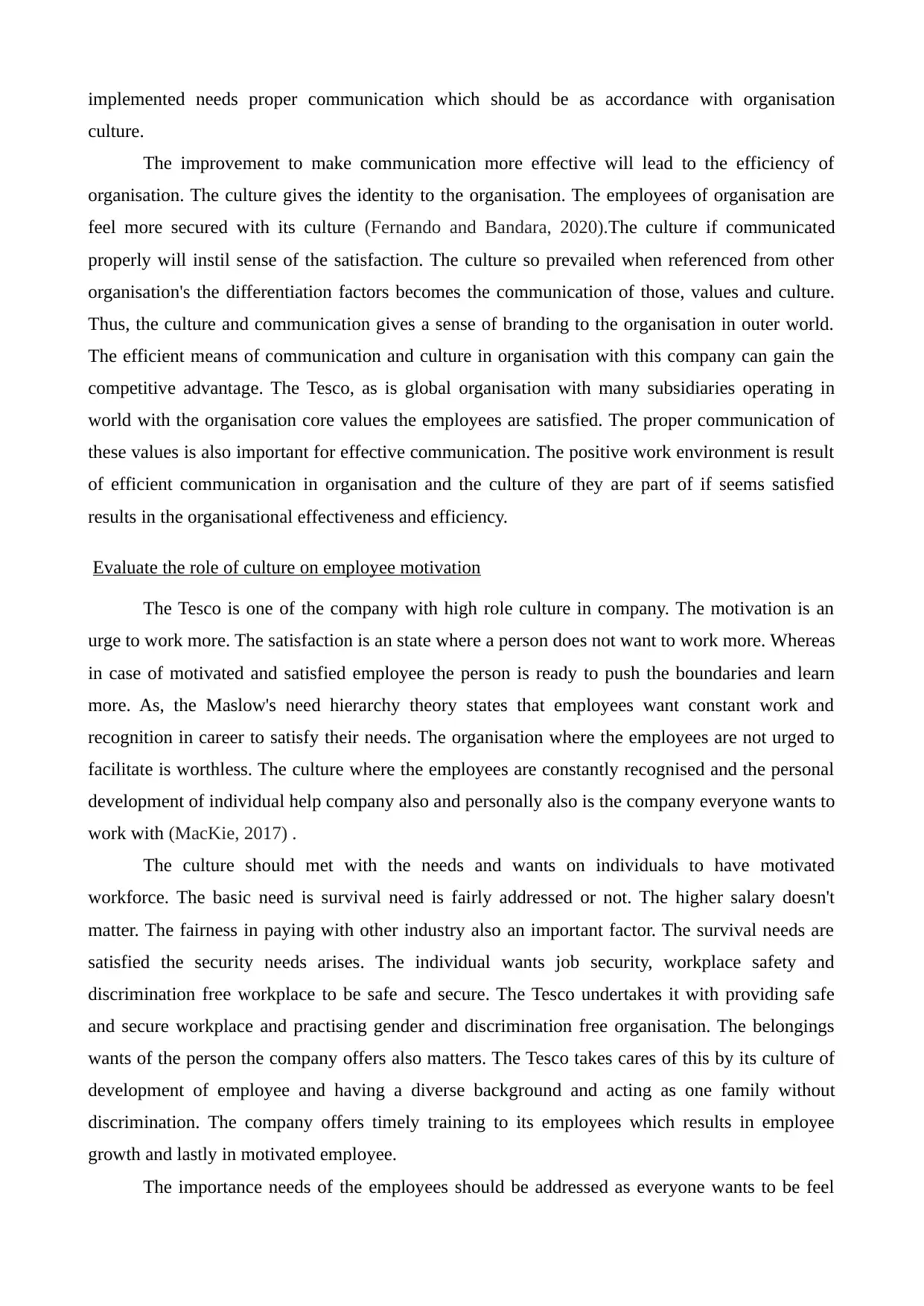
implemented needs proper communication which should be as accordance with organisation
culture.
The improvement to make communication more effective will lead to the efficiency of
organisation. The culture gives the identity to the organisation. The employees of organisation are
feel more secured with its culture (Fernando and Bandara, 2020).The culture if communicated
properly will instil sense of the satisfaction. The culture so prevailed when referenced from other
organisation's the differentiation factors becomes the communication of those, values and culture.
Thus, the culture and communication gives a sense of branding to the organisation in outer world.
The efficient means of communication and culture in organisation with this company can gain the
competitive advantage. The Tesco, as is global organisation with many subsidiaries operating in
world with the organisation core values the employees are satisfied. The proper communication of
these values is also important for effective communication. The positive work environment is result
of efficient communication in organisation and the culture of they are part of if seems satisfied
results in the organisational effectiveness and efficiency.
Evaluate the role of culture on employee motivation
The Tesco is one of the company with high role culture in company. The motivation is an
urge to work more. The satisfaction is an state where a person does not want to work more. Whereas
in case of motivated and satisfied employee the person is ready to push the boundaries and learn
more. As, the Maslow's need hierarchy theory states that employees want constant work and
recognition in career to satisfy their needs. The organisation where the employees are not urged to
facilitate is worthless. The culture where the employees are constantly recognised and the personal
development of individual help company also and personally also is the company everyone wants to
work with (MacKie, 2017) .
The culture should met with the needs and wants on individuals to have motivated
workforce. The basic need is survival need is fairly addressed or not. The higher salary doesn't
matter. The fairness in paying with other industry also an important factor. The survival needs are
satisfied the security needs arises. The individual wants job security, workplace safety and
discrimination free workplace to be safe and secure. The Tesco undertakes it with providing safe
and secure workplace and practising gender and discrimination free organisation. The belongings
wants of the person the company offers also matters. The Tesco takes cares of this by its culture of
development of employee and having a diverse background and acting as one family without
discrimination. The company offers timely training to its employees which results in employee
growth and lastly in motivated employee.
The importance needs of the employees should be addressed as everyone wants to be feel
culture.
The improvement to make communication more effective will lead to the efficiency of
organisation. The culture gives the identity to the organisation. The employees of organisation are
feel more secured with its culture (Fernando and Bandara, 2020).The culture if communicated
properly will instil sense of the satisfaction. The culture so prevailed when referenced from other
organisation's the differentiation factors becomes the communication of those, values and culture.
Thus, the culture and communication gives a sense of branding to the organisation in outer world.
The efficient means of communication and culture in organisation with this company can gain the
competitive advantage. The Tesco, as is global organisation with many subsidiaries operating in
world with the organisation core values the employees are satisfied. The proper communication of
these values is also important for effective communication. The positive work environment is result
of efficient communication in organisation and the culture of they are part of if seems satisfied
results in the organisational effectiveness and efficiency.
Evaluate the role of culture on employee motivation
The Tesco is one of the company with high role culture in company. The motivation is an
urge to work more. The satisfaction is an state where a person does not want to work more. Whereas
in case of motivated and satisfied employee the person is ready to push the boundaries and learn
more. As, the Maslow's need hierarchy theory states that employees want constant work and
recognition in career to satisfy their needs. The organisation where the employees are not urged to
facilitate is worthless. The culture where the employees are constantly recognised and the personal
development of individual help company also and personally also is the company everyone wants to
work with (MacKie, 2017) .
The culture should met with the needs and wants on individuals to have motivated
workforce. The basic need is survival need is fairly addressed or not. The higher salary doesn't
matter. The fairness in paying with other industry also an important factor. The survival needs are
satisfied the security needs arises. The individual wants job security, workplace safety and
discrimination free workplace to be safe and secure. The Tesco undertakes it with providing safe
and secure workplace and practising gender and discrimination free organisation. The belongings
wants of the person the company offers also matters. The Tesco takes cares of this by its culture of
development of employee and having a diverse background and acting as one family without
discrimination. The company offers timely training to its employees which results in employee
growth and lastly in motivated employee.
The importance needs of the employees should be addressed as everyone wants to be feel
⊘ This is a preview!⊘
Do you want full access?
Subscribe today to unlock all pages.

Trusted by 1+ million students worldwide
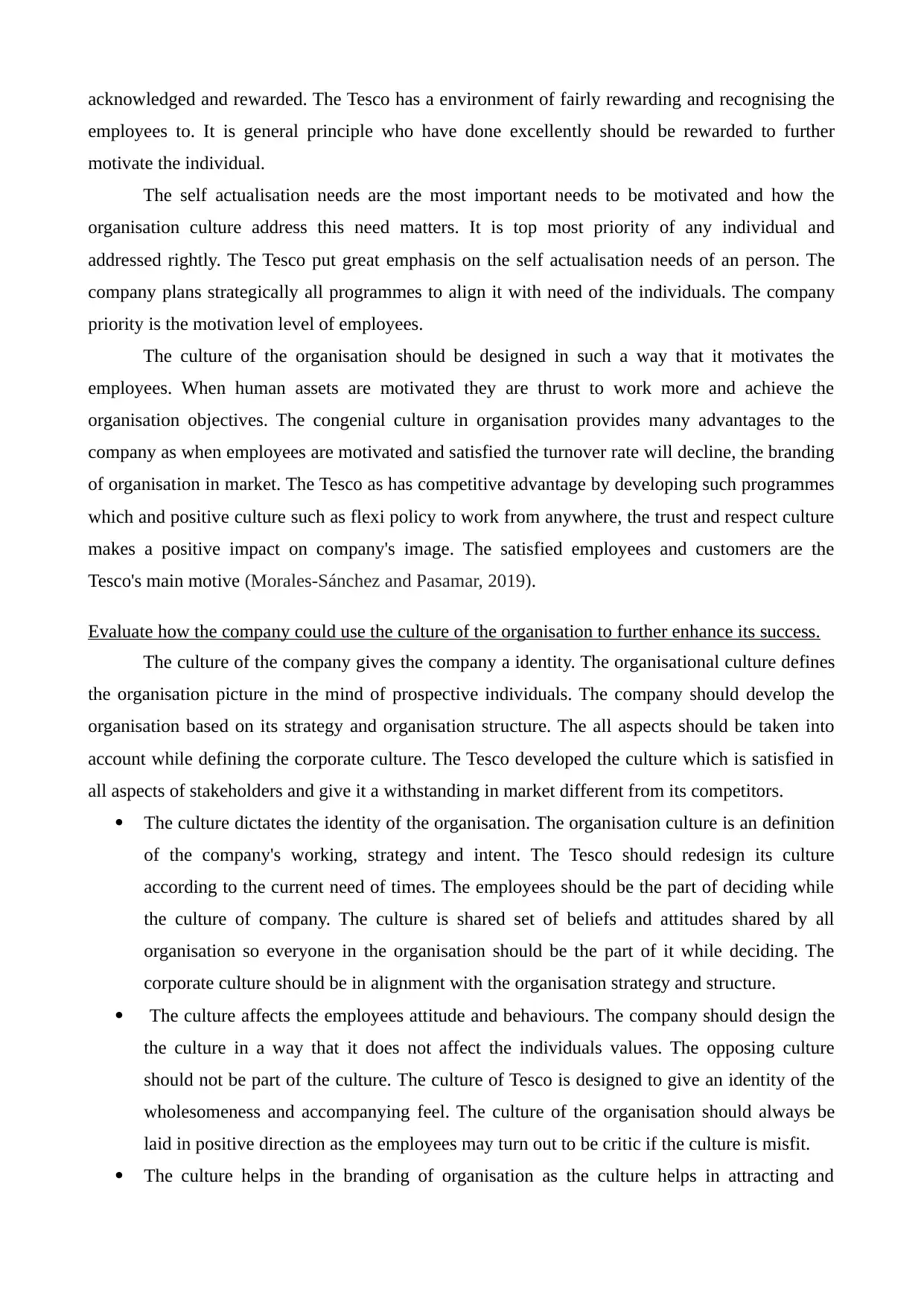
acknowledged and rewarded. The Tesco has a environment of fairly rewarding and recognising the
employees to. It is general principle who have done excellently should be rewarded to further
motivate the individual.
The self actualisation needs are the most important needs to be motivated and how the
organisation culture address this need matters. It is top most priority of any individual and
addressed rightly. The Tesco put great emphasis on the self actualisation needs of an person. The
company plans strategically all programmes to align it with need of the individuals. The company
priority is the motivation level of employees.
The culture of the organisation should be designed in such a way that it motivates the
employees. When human assets are motivated they are thrust to work more and achieve the
organisation objectives. The congenial culture in organisation provides many advantages to the
company as when employees are motivated and satisfied the turnover rate will decline, the branding
of organisation in market. The Tesco as has competitive advantage by developing such programmes
which and positive culture such as flexi policy to work from anywhere, the trust and respect culture
makes a positive impact on company's image. The satisfied employees and customers are the
Tesco's main motive (Morales-Sánchez and Pasamar, 2019).
Evaluate how the company could use the culture of the organisation to further enhance its success.
The culture of the company gives the company a identity. The organisational culture defines
the organisation picture in the mind of prospective individuals. The company should develop the
organisation based on its strategy and organisation structure. The all aspects should be taken into
account while defining the corporate culture. The Tesco developed the culture which is satisfied in
all aspects of stakeholders and give it a withstanding in market different from its competitors.
The culture dictates the identity of the organisation. The organisation culture is an definition
of the company's working, strategy and intent. The Tesco should redesign its culture
according to the current need of times. The employees should be the part of deciding while
the culture of company. The culture is shared set of beliefs and attitudes shared by all
organisation so everyone in the organisation should be the part of it while deciding. The
corporate culture should be in alignment with the organisation strategy and structure.
The culture affects the employees attitude and behaviours. The company should design the
the culture in a way that it does not affect the individuals values. The opposing culture
should not be part of the culture. The culture of Tesco is designed to give an identity of the
wholesomeness and accompanying feel. The culture of the organisation should always be
laid in positive direction as the employees may turn out to be critic if the culture is misfit.
The culture helps in the branding of organisation as the culture helps in attracting and
employees to. It is general principle who have done excellently should be rewarded to further
motivate the individual.
The self actualisation needs are the most important needs to be motivated and how the
organisation culture address this need matters. It is top most priority of any individual and
addressed rightly. The Tesco put great emphasis on the self actualisation needs of an person. The
company plans strategically all programmes to align it with need of the individuals. The company
priority is the motivation level of employees.
The culture of the organisation should be designed in such a way that it motivates the
employees. When human assets are motivated they are thrust to work more and achieve the
organisation objectives. The congenial culture in organisation provides many advantages to the
company as when employees are motivated and satisfied the turnover rate will decline, the branding
of organisation in market. The Tesco as has competitive advantage by developing such programmes
which and positive culture such as flexi policy to work from anywhere, the trust and respect culture
makes a positive impact on company's image. The satisfied employees and customers are the
Tesco's main motive (Morales-Sánchez and Pasamar, 2019).
Evaluate how the company could use the culture of the organisation to further enhance its success.
The culture of the company gives the company a identity. The organisational culture defines
the organisation picture in the mind of prospective individuals. The company should develop the
organisation based on its strategy and organisation structure. The all aspects should be taken into
account while defining the corporate culture. The Tesco developed the culture which is satisfied in
all aspects of stakeholders and give it a withstanding in market different from its competitors.
The culture dictates the identity of the organisation. The organisation culture is an definition
of the company's working, strategy and intent. The Tesco should redesign its culture
according to the current need of times. The employees should be the part of deciding while
the culture of company. The culture is shared set of beliefs and attitudes shared by all
organisation so everyone in the organisation should be the part of it while deciding. The
corporate culture should be in alignment with the organisation strategy and structure.
The culture affects the employees attitude and behaviours. The company should design the
the culture in a way that it does not affect the individuals values. The opposing culture
should not be part of the culture. The culture of Tesco is designed to give an identity of the
wholesomeness and accompanying feel. The culture of the organisation should always be
laid in positive direction as the employees may turn out to be critic if the culture is misfit.
The culture helps in the branding of organisation as the culture helps in attracting and
Paraphrase This Document
Need a fresh take? Get an instant paraphrase of this document with our AI Paraphraser
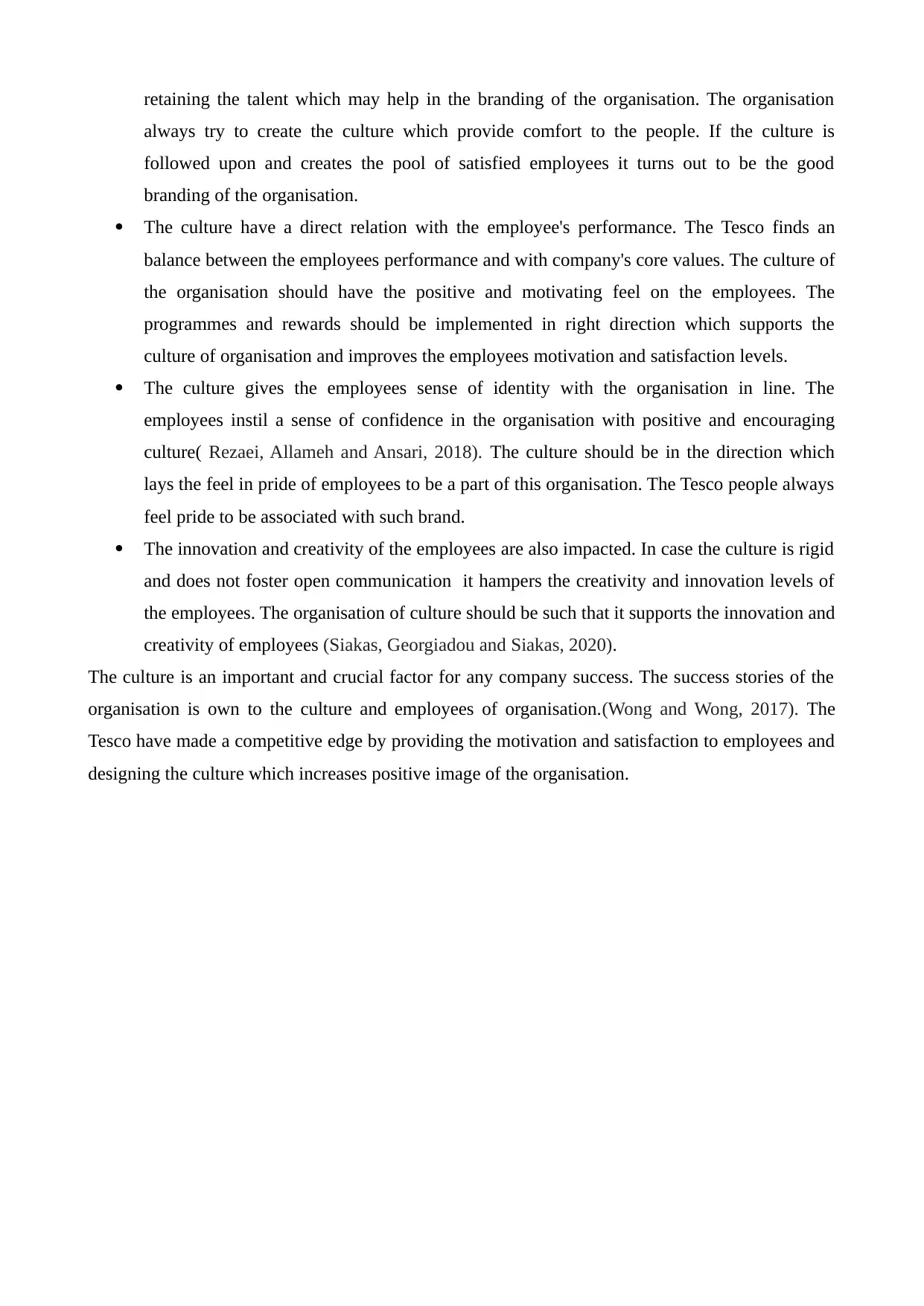
retaining the talent which may help in the branding of the organisation. The organisation
always try to create the culture which provide comfort to the people. If the culture is
followed upon and creates the pool of satisfied employees it turns out to be the good
branding of the organisation.
The culture have a direct relation with the employee's performance. The Tesco finds an
balance between the employees performance and with company's core values. The culture of
the organisation should have the positive and motivating feel on the employees. The
programmes and rewards should be implemented in right direction which supports the
culture of organisation and improves the employees motivation and satisfaction levels.
The culture gives the employees sense of identity with the organisation in line. The
employees instil a sense of confidence in the organisation with positive and encouraging
culture( Rezaei, Allameh and Ansari, 2018). The culture should be in the direction which
lays the feel in pride of employees to be a part of this organisation. The Tesco people always
feel pride to be associated with such brand.
The innovation and creativity of the employees are also impacted. In case the culture is rigid
and does not foster open communication it hampers the creativity and innovation levels of
the employees. The organisation of culture should be such that it supports the innovation and
creativity of employees (Siakas, Georgiadou and Siakas, 2020).
The culture is an important and crucial factor for any company success. The success stories of the
organisation is own to the culture and employees of organisation.(Wong and Wong, 2017). The
Tesco have made a competitive edge by providing the motivation and satisfaction to employees and
designing the culture which increases positive image of the organisation.
always try to create the culture which provide comfort to the people. If the culture is
followed upon and creates the pool of satisfied employees it turns out to be the good
branding of the organisation.
The culture have a direct relation with the employee's performance. The Tesco finds an
balance between the employees performance and with company's core values. The culture of
the organisation should have the positive and motivating feel on the employees. The
programmes and rewards should be implemented in right direction which supports the
culture of organisation and improves the employees motivation and satisfaction levels.
The culture gives the employees sense of identity with the organisation in line. The
employees instil a sense of confidence in the organisation with positive and encouraging
culture( Rezaei, Allameh and Ansari, 2018). The culture should be in the direction which
lays the feel in pride of employees to be a part of this organisation. The Tesco people always
feel pride to be associated with such brand.
The innovation and creativity of the employees are also impacted. In case the culture is rigid
and does not foster open communication it hampers the creativity and innovation levels of
the employees. The organisation of culture should be such that it supports the innovation and
creativity of employees (Siakas, Georgiadou and Siakas, 2020).
The culture is an important and crucial factor for any company success. The success stories of the
organisation is own to the culture and employees of organisation.(Wong and Wong, 2017). The
Tesco have made a competitive edge by providing the motivation and satisfaction to employees and
designing the culture which increases positive image of the organisation.
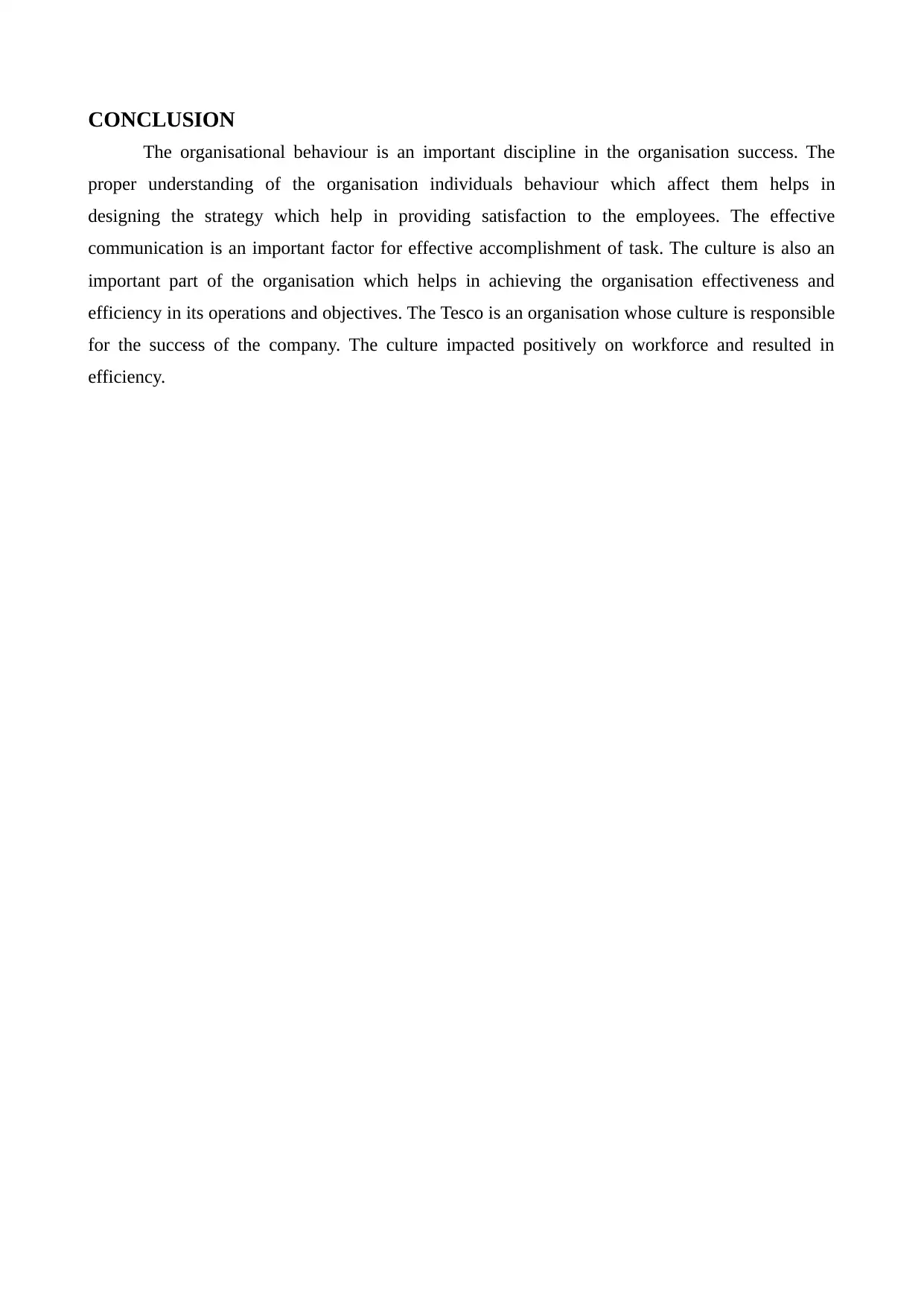
CONCLUSION
The organisational behaviour is an important discipline in the organisation success. The
proper understanding of the organisation individuals behaviour which affect them helps in
designing the strategy which help in providing satisfaction to the employees. The effective
communication is an important factor for effective accomplishment of task. The culture is also an
important part of the organisation which helps in achieving the organisation effectiveness and
efficiency in its operations and objectives. The Tesco is an organisation whose culture is responsible
for the success of the company. The culture impacted positively on workforce and resulted in
efficiency.
The organisational behaviour is an important discipline in the organisation success. The
proper understanding of the organisation individuals behaviour which affect them helps in
designing the strategy which help in providing satisfaction to the employees. The effective
communication is an important factor for effective accomplishment of task. The culture is also an
important part of the organisation which helps in achieving the organisation effectiveness and
efficiency in its operations and objectives. The Tesco is an organisation whose culture is responsible
for the success of the company. The culture impacted positively on workforce and resulted in
efficiency.
⊘ This is a preview!⊘
Do you want full access?
Subscribe today to unlock all pages.

Trusted by 1+ million students worldwide
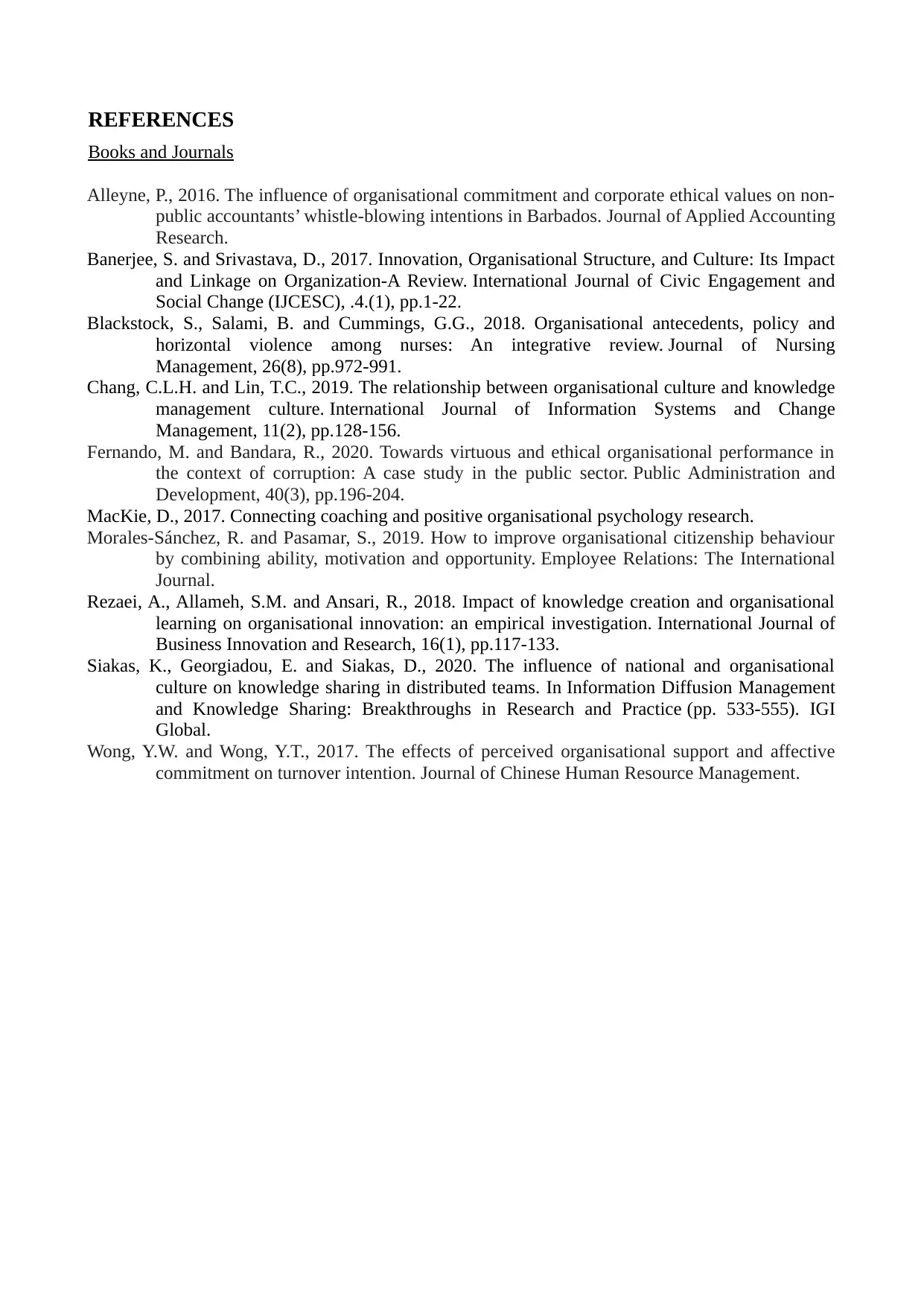
REFERENCES
Books and Journals
Alleyne, P., 2016. The influence of organisational commitment and corporate ethical values on non-
public accountants’ whistle-blowing intentions in Barbados. Journal of Applied Accounting
Research.
Banerjee, S. and Srivastava, D., 2017. Innovation, Organisational Structure, and Culture: Its Impact
and Linkage on Organization-A Review. International Journal of Civic Engagement and
Social Change (IJCESC), .4.(1), pp.1-22.
Blackstock, S., Salami, B. and Cummings, G.G., 2018. Organisational antecedents, policy and
horizontal violence among nurses: An integrative review. Journal of Nursing
Management, 26(8), pp.972-991.
Chang, C.L.H. and Lin, T.C., 2019. The relationship between organisational culture and knowledge
management culture. International Journal of Information Systems and Change
Management, 11(2), pp.128-156.
Fernando, M. and Bandara, R., 2020. Towards virtuous and ethical organisational performance in
the context of corruption: A case study in the public sector. Public Administration and
Development, 40(3), pp.196-204.
MacKie, D., 2017. Connecting coaching and positive organisational psychology research.
Morales-Sánchez, R. and Pasamar, S., 2019. How to improve organisational citizenship behaviour
by combining ability, motivation and opportunity. Employee Relations: The International
Journal.
Rezaei, A., Allameh, S.M. and Ansari, R., 2018. Impact of knowledge creation and organisational
learning on organisational innovation: an empirical investigation. International Journal of
Business Innovation and Research, 16(1), pp.117-133.
Siakas, K., Georgiadou, E. and Siakas, D., 2020. The influence of national and organisational
culture on knowledge sharing in distributed teams. In Information Diffusion Management
and Knowledge Sharing: Breakthroughs in Research and Practice (pp. 533-555). IGI
Global.
Wong, Y.W. and Wong, Y.T., 2017. The effects of perceived organisational support and affective
commitment on turnover intention. Journal of Chinese Human Resource Management.
Books and Journals
Alleyne, P., 2016. The influence of organisational commitment and corporate ethical values on non-
public accountants’ whistle-blowing intentions in Barbados. Journal of Applied Accounting
Research.
Banerjee, S. and Srivastava, D., 2017. Innovation, Organisational Structure, and Culture: Its Impact
and Linkage on Organization-A Review. International Journal of Civic Engagement and
Social Change (IJCESC), .4.(1), pp.1-22.
Blackstock, S., Salami, B. and Cummings, G.G., 2018. Organisational antecedents, policy and
horizontal violence among nurses: An integrative review. Journal of Nursing
Management, 26(8), pp.972-991.
Chang, C.L.H. and Lin, T.C., 2019. The relationship between organisational culture and knowledge
management culture. International Journal of Information Systems and Change
Management, 11(2), pp.128-156.
Fernando, M. and Bandara, R., 2020. Towards virtuous and ethical organisational performance in
the context of corruption: A case study in the public sector. Public Administration and
Development, 40(3), pp.196-204.
MacKie, D., 2017. Connecting coaching and positive organisational psychology research.
Morales-Sánchez, R. and Pasamar, S., 2019. How to improve organisational citizenship behaviour
by combining ability, motivation and opportunity. Employee Relations: The International
Journal.
Rezaei, A., Allameh, S.M. and Ansari, R., 2018. Impact of knowledge creation and organisational
learning on organisational innovation: an empirical investigation. International Journal of
Business Innovation and Research, 16(1), pp.117-133.
Siakas, K., Georgiadou, E. and Siakas, D., 2020. The influence of national and organisational
culture on knowledge sharing in distributed teams. In Information Diffusion Management
and Knowledge Sharing: Breakthroughs in Research and Practice (pp. 533-555). IGI
Global.
Wong, Y.W. and Wong, Y.T., 2017. The effects of perceived organisational support and affective
commitment on turnover intention. Journal of Chinese Human Resource Management.
1 out of 10
Related Documents
Your All-in-One AI-Powered Toolkit for Academic Success.
+13062052269
info@desklib.com
Available 24*7 on WhatsApp / Email
![[object Object]](/_next/static/media/star-bottom.7253800d.svg)
Unlock your academic potential
Copyright © 2020–2025 A2Z Services. All Rights Reserved. Developed and managed by ZUCOL.





